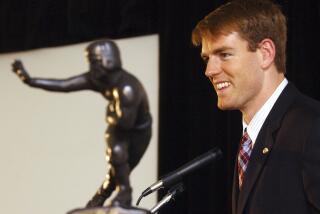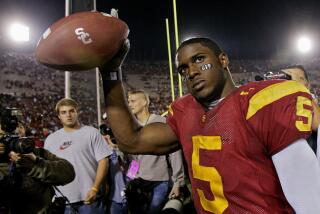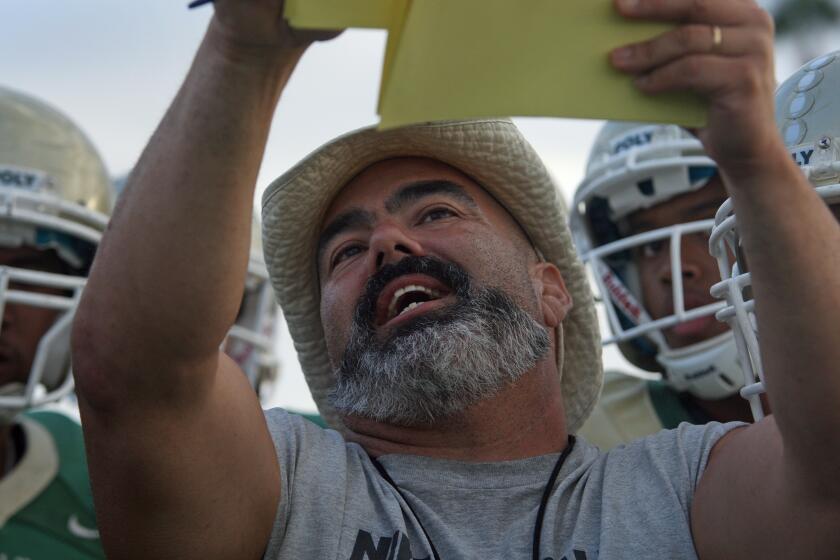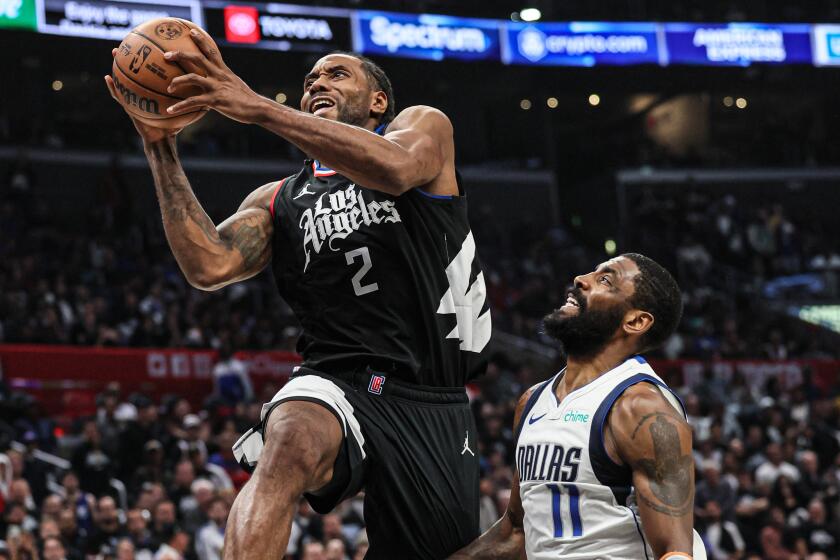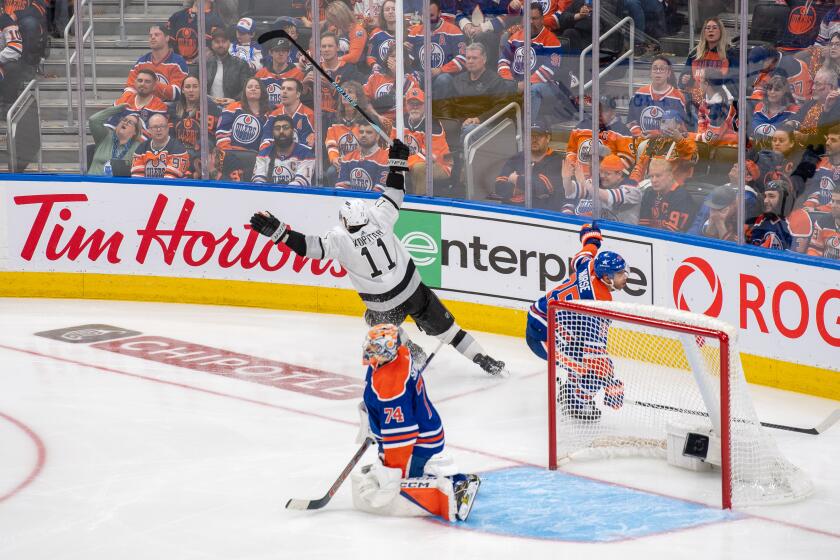REGIONAL REPORT : Dish Owners Fried Over Scrambling : Pro football: Owners of sports bars and home satellite systems are furious over the decision by the NFL that would make them watch local teams.
Lowell Ganz may be the essence of the contemporary urban sports fan. A Hollywood screenwriter from New York, he lives in Los Angeles, where, via his home satellite dish, he spends fall Sundays watching his favorite entry in the NFL, the New York Giants.
Ganz is passionate about sports and obsessive about certain teams, almost all of which play in New York. He will tell you without apology that, except for the Lakers, he has no interest in local teams.
But come Sept. 9, Ganz’s viewing habits and those of millions of Americans will be radically--perhaps irrevocably--altered.
Last week the NFL announced that, with the start of the regular season two weeks from today, most of its games will be “scrambled.” And, the league added, no option to “de-scramble” will be available.
The announcement was shocking to Ganz and thousands of owners of satellite systems and devastating to a new urban subculture--patrons of sports bars, which have proliferated almost as fast as America’s mobile society.
It’s common in bars and restaurants for local residents--many who do not root for the local team--to order a pitcher of beer and sit around watching almost every NFL team except the one playing in their city.
The reason for this, say proprietors such as Norman Lebovitz, who owns three Sluggo’s in San Diego, is that the United States isn’t what it used to be. It is a nation of nomads, and nowhere is that more evident than in Southern California.
“People from every place live every place,” said Lebovitz, and as a result, fans revel in satellite technology that allows them to maintain ties to the New York Giants, Chicago Bears, Dallas Cowboys, et al .
By use of a “dish,” sports enthusiasts receive NFL broadcasts as they are beamed from satellites orbiting 22,300 miles away. With several dishes, the restaurant-bar proprietor can pick up virtually every NFL game on any given Sunday. It’s great for the super fan, or the transplanted Bear or Giant addict, as Lebovitz and Ganz point out, because he or she isn’t “force-fed” what the network wants them to see.
But that’s exactly what the networks--and the league--want to change.
“CBS, NBC, ABC--their signals should be available only to affiliates,” said Val Pinchbeck, the NFL’s vice president in charge of broadcasting. “(Sports) bars have proliferated over the course of 10 years, and in our opinion, they’ve done nothing but steal our signals. So, we’re taking efforts to stop it.”
Pinchbeck said the networks have a valuable ally--the law. The NFL contends that unauthorized use of telecasts infringes on rights protected under the Copyright Act of 1976. Pinchbeck also believes that bar owners who intercept satellite signals--and redistribute them for profit--are breaking the Communications Act of 1934.
He said the league has pursued lawsuits against sports bars in Buffalo; Tampa, Fla.; Dallas; Kansas City, Mo.; Detroit; New Orleans; Houston and Chicago, “and that didn’t stop it, so maybe scrambling will. We’re tired of it, plain and simple.” In the cities in which cases came to trial--Miami and St. Louis--”the league won easily,” Pinchbeck said.
His feeling is that local and regional advertisers across the country are being shortchanged. Because satellite dishes receive only network feeds and do not pick up the transmissions of local stations, local and regional commercials are simply not seen.
“If you’re watching the NFL in a sports bar, then you’re not watching the local affiliate, and you’re not seeing the (local) commercials,” Pinchbeck said. “The . . . networks pay a ton of money for these games (the new 4-year agreement is for a record $3.6 billion). In one of our cases, the court equated what these bars and restaurants are doing to wiretapping. How is it different? They’re stealing a copyrighted signal and using it for their own profit or gain. So, let them squawk--we’ve got the law on our side.”
Squawk they have. Since word of scrambling surfaced, sports-bar owners across the country have begun to rally. San Diego’s Lebovitz has become the head of a Southern California coalition, the Assn. for Sports Fans’ Rights. The group held its first meeting Monday in San Diego, and more than 40 irate owners of sports bars--as well as eight attorneys--attended.
David A. Dougherty, the vice president of Sports Legends, Inc., which operates Legends in Long Beach, said that his company has written an “angry” letter to the NFL demanding at least a de-scrambling alternative. With four “big” screens, five video monitors and four rooftop dishes--an investment, by Dougherty’s calculation, of more than $50,000--Legends averages about 300 patrons a Sunday during the fall.
Dougherty and other bar owners equate their endeavors to college athletic programs, in which football bankrolls the rest of the year. And without the NFL. . . . Well, Dougherty said, many will simply go under. Lebovitz calls it the “death of hundreds of small businesses across America.”
But, again, there’s the question of law. Dougherty, Lebovitz and John Tyler, manager of C.J. Brett’s in Hermosa Beach, maintain no laws are being broken by receiving what’s “free and clear” over the airwaves. Each pays fees to various cable outlets, such as ESPN and TNT, both of which will carry a handful of national NFL games as part of the new 4-year package.
ESPN and TNT are scrambled, but viewers can have them de-scrambled by obtaining an authorized decoder and paying a fee. No such option will accompany the NFL on CBS, which, in Pinchbeck’s words, will be “fully scrambled” by Sept. 9, or on NBC, whose technology will be in place by mid-season.
To counteract the league’s and the networks’ rigidity, Lebovitz said “the law needs to be changed.” Rep. Jim Bates (D-San Diego), a member of the House Committee of Energy and Commerce, said that, after hearing from outraged constituents, he plans to ask the Telecommunications Subcommittee to “investigate” the NFL and decide whether scrambling is “legally appropriate.” He may even introduce legislation, Bates said, to try to put a stop the scrambling before it starts.
A senior official at NBC, requesting anonymity, said the networks demanded scrambling because dish owners and patrons of sports bars represent a threat to the all-important Nielsen ratings.
“If every football fan in America went to sports bars to watch the games, there would be nobody at home watching games,” the official said from New York. “That’s what we want, that’s what we live by--people at home watching games.
“Advertisers don’t pay the dish owner. They pay the networks and the local affiliates. If you’re not watching at home, you represent an audience that can’t be measured--by the Nielsen ratings or any other survey I know of.”
The NBC official said that his network invested “more than $5 million” on scrambling technology that omits the ability to de-scramble, “which is why it has taken so long.” CBS officials claimed not to know their network’s investment.
In San Diego, Lebovitz said attorneys for the Assn. for Sports Fans’ Rights are “exploring the possibility” of obtaining an injunction to prevent scrambling before it starts on Sept. 9.
“We believe the NFL is vulnerable in the antitrust area,” Lebovitz said. “And I just don’t buy the argument that I should sit home on Sunday afternoons watching a game I don’t want to see so the networks can get a head count (via the ratings system). . . . So that, what, they can make $5 billion instead of $3.6 billion? I’m sorry, but I just can’t count that high.”
Ganz, the die-hard Giant fan whose screen writing credits include “Splash,” “Night Shift,” “Parenthood” and “Gung Ho,” said he would avoid football rather than watch the Raiders or the Rams.
“To me, it’s extremely short-sighted,” Ganz said. “It’s the same as me driving to McDonald’s three miles away and them telling me, ‘Sorry, we can’t sell you a Big Mac here, because you’re out of your geographical area. You’ll have to go back to the McDonald’s near your house and buy your Big Mac there. OK?’ That’s essentially what they’re doing.”
Said Lebovitz: “Yeah, I don’t know of any other business in America that tells you, ‘Sorry, you can’t buy our product. No matter how much you like it, you just can’t have it--unless, of course, it’s strictly on our terms.’ ”
More to Read
Get our high school sports newsletter
Prep Rally is devoted to the SoCal high school sports experience, bringing you scores, stories and a behind-the-scenes look at what makes prep sports so popular.
You may occasionally receive promotional content from the Los Angeles Times.

